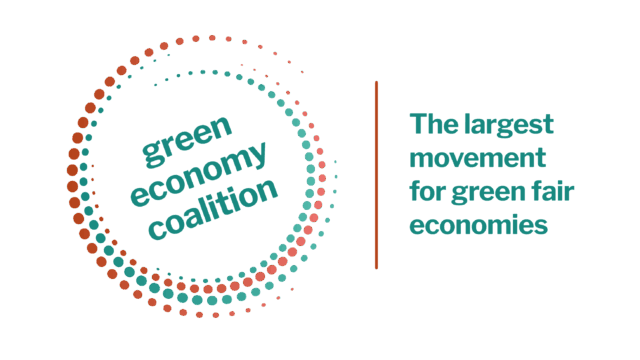The future of green economy - 2023 and beyond
Our convenor Oliver Greenfield looks ahead to the emerging trends and patterns shaping the next twelve months of policy debate and action

What will the shape of 2023 be? How will things stand in 11 months’ time? And where can we strategically give a push and a prod to accelerate desperately-needed changes to our economies, societies and institutions?
We know what we need to do – in fact we’ve known (more or less) what needs to change for over a decade now (if you need a quick reminder, check out our Five Principles of Green Economy and the Green Economy Tracker). The thorny bit is the how: how can green economic change be best designed, implemented, and sustained; how can we manage trade-offs and compromises; how can we structure risk and reward to incentivise without imperilling; how can we manage the transition so that everyone’s voices are heard?
To answer all those questions, we need to understand the social and political landscapes that shape them. Briefly, the trends are an awkward dance between those two age-old saws of crisis and opportunity.
Supercalerfragelistic-polymorphous-hypercrisis
The idea of “polycrisis” is everywhere at the moment: a state of escalating and permanent, interacting crises straining societal, economic and governance capacities. Recession, inflation, debt, spiralling cost of living; extreme weather and extreme politics; shortages of water, energy, fertiliser, food; political instability, movement polarisation and social unrest. All this precarity creates its own inertia as policymakers feel increasingly overtaken by events, unable to predict or respond, their inaction ultimately benefiting the delayers and status quo-niks in big oil and big finance.
Then there’s the opportunity, especially in the green economy. The $738 billion Inflation Reduction Act in the US is genuinely a game changer, it joins the €1 trillion EU Green Deal and China’s gargantuan investments in renewables and battery technology, potentially as much as $3 trillion going back almost a decade. The three main economic blocs are now getting serious about green economic sectors, stimulating, subsidising, and competing to attract private investment and jobs.
“ Incremental change will not be fast enough, but we also know that governments and businesses will not naturally move beyond mere incremental reform unless forced to do so.”
The rest of the world cannot ignore this, and most are responding. Good news headlines like these pop into my inbox daily – “Bangladesh aims to establish 100 green economic zones this decade to help alleviate poverty across the country.” “The UK's green economy contributed £71bn in Gross Value Added (GVA) last year.” So global, regional and national markets are moving. This also means that this economic opportunity agenda is also finally landing in the traditional climate sceptic centre-right so it is less likely to disappear as politics flips.
Trendspotting
What are the other big trends likely to have an impact this year?
At the big climate and biodiversity negotiations that rounded off 2022, one of the biggest emerging challenges was the lack of accountability for governments on meeting commitments. After all, “1.5 degrees” or “30x30” will remain paper tigers without real mechanisms to police what’s actually being done to achieve them. So civic space, participatory mechanisms and the watchdog role of NGOs will be key in 2023 as we move from ambition to implementation.
Another important outcome from the climate COP was the Bridgetown Initiative, a new movement of climate-vulnerable countries pushing for a massive overhaul of the institutions of global finance to unlock greater funding for the climate transition. By rebuilding the IMF, World Bank and other Bretton Woods throwbacks, Bridgetown aims to unlock private investment, widen access to liquidity for states most at risk of climate impacts, fund loss and damage and make the system itself more shock absorbent. Keep an eye on these proposals through 2023, as they might just upend the entire structure of global finance that has endured for almost 80 years.
Geopolitically, arguably the hardest part the Ukraine energy crisis is still to come. Europe has got through the worst of the winter without major blackouts – a genuine fear just a few months ago – and the EU and the G7 are implementing bans and price caps on Russian oil & gas that should see imports further dwindle and renewables boom. But Russian gas has found new markets in China and India, while the military situation in Ukraine shows worrying signs of stalemate. The consequences on global markets for food, fertilizer and energy will only intensify through the spring and summer.

From a media perspective, we’re seeing a resurgence of activity in the new economy space and a pause or regathering in the climate space, especially in the UK. A new narrative focus around cost of living issues and the big profits of dirty energy companies is amplifying existing social anger on debt, tax, and inequality, while big institutions and governments find themselves under fire on climate finance, liquidity and protectionism. All the while, communications platforms and channels continue to fragment as audiences self-stratify ever further, making big, game-changing social stories and big broadcast pieces harder to land.
Our priorities for the new year
So within this context, the GEC is now working almost exclusively on the how question. We recognise that incremental change will not be fast enough, but we also know that governments and businesses will not naturally move beyond mere incremental reform unless forced to do so. A transition that benefits everyone is not the default solution; left unchecked, the current free-market dominance will means the profits of green transition being privatised and the costs socialised.
At a broader governance level, we recognise that in its current state, democracy is largely ill-equipped to manage or guide the transformations required. But we also believe in the truth of what Winston Churchill once said: democracy is the worst system of government, except for all the others. Democracy is under threat from all sides, but this transition will fail unless we are able to reinvigorate our democratic institutions so that equity, representation and popular legitimacy are at its core once again. We hope to work across fault lines between people and power to help build the mandate for just transition – or as we’re calling it, a new social contract for a shared green deal.
So our work in 2023 will be about delivering the conditions, the demands, and the social pressure for transformative economic reform. Watch this space.
- Oliver Greenfield, Convenor, GEC


